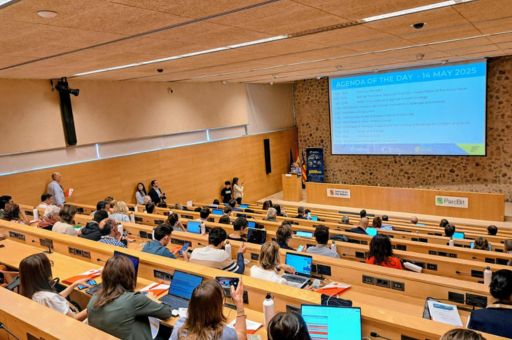Palma hosted the Clusters Meet Regions event on May 14 and 15, a European initiative driven by the European Commission through the European Cluster Collaboration Platform (ECCP), with the support of the Government of the Balearic Islands and the Bit Foundation. Nearly one hundred representatives of clusters, SMES, public institutions, and innovation agents took part in the event, which focused on the role of clusters as drivers of regional transition toward a circular economy.
The event was opened by Antoni Costa, Minister of Economy, Finance and Innovation, who emphasised the regional government’s commitment to “building a strategy based on innovation, economic diversification, and sustainability.” He stressed the importance of cluster policies as a tool for revitalising the business ecosystem and moving toward a more resilient and high-value-added production model, while also noting the need for broader territorial impact.
TDB keeps you informed. Follow us on: Facebook, Twitter and Instagram
Nearly 100 European Professionals Participate in Clusters Meet Regions at ParcBit
From the European Commission, Marta Batalla, Policy Officer at the Unit for Alliances and Clusters (DG GROW), highlighted that the Clusters Meet Regions initiative aims to promote the exchange of good practices between European regions. She emphasised the key role of clusters in boosting competitiveness and ecological transition:
“Clusters can be decisive in bringing innovation to industry, fostering collaboration between SMES and large companies, and reducing dependency on critical materials.”
Jan-Philipp Kramer, Head of EU Services at Prognos and project leader for the ECCP, presented the baseline document on regional priorities for the Balearic Islands, based on an analysis of 21 European regions. He emphasised the importance of driving economic diversification through technological and social innovation, especially in a region heavily reliant on the service sector. According to Kramer, clusters can play a key role in this transition by boosting entrepreneurship, STEM education, and the attraction of innovative projects.
During the working sessions, participants explored how circular economy principles can be applied to key sectors such as tourism, the marine industry, and healthcare. Institutional and business representatives shared success stories in technological innovation, sustainable water and waste management, and the development of new business models based on data and industrial symbiosis.
Sebastián González, Director General of Innovation and Digital Transformation for the Balearic Islands, shared the region’s strategic vision for applying innovation to green and digital transitions. He described the Balearic Islands as a true innovation lab for public policy, where advanced solutions are developed and tested, with the potential to be replicated across other European territories. He emphasised the need to create collaborative spaces between businesses, public administration, and knowledge institutions to foster new business models linked to circularity and sustainability.
One of the flagship projects presented was the deployment of the Balearic Islands’ digital twin, a technological infrastructure based on real-time data collected by over 1,000 sensors across the territory. This system enables simulations and predictions to support better decision-making in water, energy, and waste management, and makes the data available to the private sector to spur innovation. González noted that integrating technologies like AI, blockchain, and 3d printing must respond to the real needs of the circular economy, avoiding tech applications disconnected from productive realities.
He also highlighted the importance of reliable, interoperable data to measure policy impacts and better direct public investments. In this regard, he advocated for the creation of secure data spaces to facilitate information sharing between administrations, research centres, and businesses, with the goal of driving results-oriented innovation. He concluded by reaffirming the Balearic Government’s support for clusters as platforms for open and cross-sector innovation, in line with the RIS3 smart specialisation strategy and the digital transformation of the regional economy.
The event also showcased the European funding roadmap for clusters and SMES, with examples of successful projects funded through programs such as Horizon Europe and the Interregional Innovation Investments (I3) program. The importance of support networks like the Enterprise Europe Network (EEN) was underlined, especially in facilitating internationalisation and business collaboration.
The second day of the event focused on direct collaboration between participants through B2B meetings and technical visits. Throughout the morning, clusters and companies met to identify cooperation opportunities at both regional and European levels and explored shared funding options for innovation projects. Simultaneously, attendees visited leading sustainability and digital transformation initiatives, gaining firsthand insight into the Balearic innovation ecosystem and establishing new partnerships for circularity, digitalisation, and sustainable regional development.
The event drew active participation from a wide range of European, national, and regional institutions committed to fostering innovation and interregional cooperation. Alongside the European Commission (DG GROW), the Balearic Islands Government’s Directorate General for Innovation and Digital Transformation and the Bit Foundation participated, together with the European Cluster Collaboration Platform (ECCP). Other entities included Prognos AG, Fundación Impulsa Baleares, the European Cluster Alliance, the Enterprise Europe Network, and representatives from EU projects such as CESAM, Platoon, DeployTour, and Medban. On a regional level, strategic clusters such as TEIB, BIOIB, Balearic Marine Cluster, Turistec, and Clúster.edu took part, as well as local companies that shared success stories in circular economy and digital transformation.
The Clusters Meet Regions event in Palma aimed to strengthen the role of clusters as agents of economic transformation, promoting interregional collaboration, sustainability-driven innovation, and diversification of production models. It fostered synergies between institutions, businesses, and knowledge organisations, while also positioning the Balearic Islands as a region fully committed to the green and digital transitions. The event was organised by the European Cluster Collaboration Platform (ECCP) on behalf of the European Commission, in collaboration with the Balearic Islands Government’s Directorate General for Innovation and Digital Transformation and the Bit Foundation.
